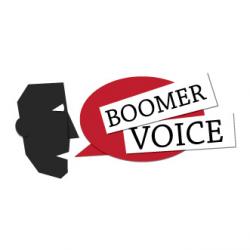
Hello from Boomer Voice!
This special column at HealthWorks Collective is a place for everyone in the digital healthcare arena to share ideas. You don’t have to be a Baby Boomer to engage here: you just need to care about Boomers and their health.
We want product developers involved because they are the ones who design the digital devices that will help us manage our health and age in place independently.

Hello from Boomer Voice!
This special column at HealthWorks Collective is a place for everyone in the digital healthcare arena to share ideas. You don’t have to be a Baby Boomer to engage here: you just need to care about Boomers and their health.
We want product developers involved because they are the ones who design the digital devices that will help us manage our health and age in place independently.
Please connect with us. Comment on our blogs, send us ideas for future posts, and help us make this a destination for Boomers and digital healthcare.
As a Baby Boomer, and digital health and fitness junkie, my mission is to talk about trends and topics that interest the 50+ audience.
Boomer Health Talk
To begin, let me share a glimpse of what’s happening inside convention halls around the country when the conversation focuses on Boomers and Healthcare.
Connected health, mhealth, Baby Boomers and chronic disease seemed to be constantly linked at digital device conferences. Proud 30-something developers display mobile apps, websites, and monitoring sensors promising to help the 50+ audience live happier, healthier and longer, independent lives.
They share their stories of helping their grandparents connect to loved ones via easy Facebook type applications. They explain how a cool looking digital device will help a “senior” whom they say is 50+ from feeling isolated. They show how wearing ear buds connected to a smart phone should be accepted by hard of hearing Boomers at restaurants or dinner parties.
Why the Interest in Boomers?
- It could be because the entire group of 78 million American Boomers is over 50-years-old, and the whole crowd will be over 65 by 2030. Giant marketplace.
- It could be that after the age of 50, a majority of consumers experience common age-related conditions including memory loss, vision and hearing impairment, and arthritis. Huge need.
- It could be because 72% of Boomers suffer from one or more chronic diseases, and the same percentage have broadband internet in their homes. Major connectivity possibilities.
- It could be by age 65, 20 percent have five or more chronic diseases, see 14 physicians — and average 40 doctor visits a year. Large medical opportunities.
- It could be because Parks Associates’ recent research for AARP shows there is a cumulative revenue in excess of $20 billion in the 50+ health care market over the next five years (2013-18). Massive potential.
Go to our Boomer Voice exclusive infographic for a great view of Boomer stats!
It could be for any and/or all of these reasons. As a Boomer I’m grateful for the developer’s ingenious thinking. But on behalf of Boomers everywhere—I’m giving a shout out to these developers and asking them to please listen to us before building products they think we will use. Boomers are NOT a “build it and we will come” audience.
Why Boomers Aren’t Adopting Mhealth Technology & Ways to Get them to Action
The AARP free report study noted that although the Boomer market is ripe for penetration, there are major stumbling blocks for this group to adopt the latest healthcare technology.
The findings include:
- Poor design and aesthetics, which limits usability and consumer demand.
- If a Boomer can’t download a consumer app without assistance, he/she isn’t going to use it. Don’t count on younger family members to help them. Many Boomers live far away from their extremely busy Millennial children.
- The inability of devices to share data via the Internet or with other devices, which limits the utility of collected data.
- This is important on so many levels. Boomers want fitness apps to integrate with weight loss apps and sync with their digital devices. Right now, Digifit does this for fitness, but it is needed on other health management tools too.
- High cost of direct-to-consumer solutions, pricing many older consumers out of the market.
- There are numerous products that are offered for $30-$40 per month. Add those up and soon a person can spend more than $100 a month on devices—much too costly for retirees.
- Low awareness among mature consumers of many cutting-edge solutions and services.
- Since most of the 50+ audience isn’t reading TechCrunch , Mashable, Business Insider, or tech blogs, the group doesn’t know these digital products exist.
- Like the famous American outlaw Jesse James replied when asked why he robbed banks, “because that’s where the money is. “ Developers need to market their products in publications that Boomers are already reading.
The conversation between talented developers and Boomers is in full swing. Now the fine turning needs to occur where the groups merge their expertise, interests, and needs to help reshape the digital healthcare experience for the nation’s aging population.
Please comment below or ask a question or suggest a topic for discussion!